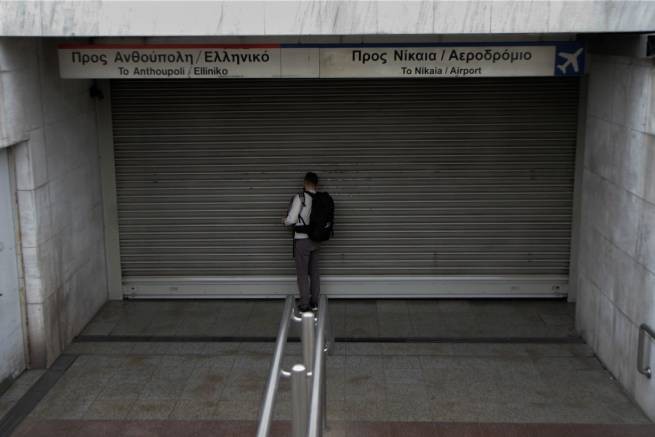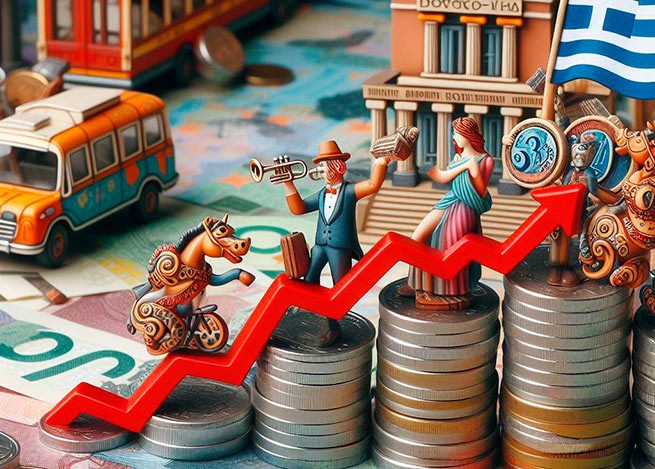Image created by AI
With the staple food price index continuing to rise above 8%, the Ministry of Development is changing anti-inflationary measures that are on the verge of implementation in an attempt to reduce supermarket bills, which became even higher in January 2024.
Even on a monthly basis, i.e. in January of this year, compared to December, despite repeated measures to maintain prices and a flurry of statements from politicians about what measures they had taken to maintain prices, households paid:
- +6.8% for olive oil,
- +5.7% for sausages,
- +4.6% for wines
- +4.1% for butter,
- +3.4% for sauces and seasonings,
- +3% for cocoa and chocolate powder,
- +3.4% for beer
- +2.8% for yoghurts and vegetables,
- +2.5% for pizzas and pies.
Thus, in essence, the perimeter of the three-month ban on tenders is expanded for those suppliers who from January 10, they increase prices for their productssince new ministerial decisions, which will be published later today and will amend the previous ones, add new categories of goods covered by this measure, and expand or reduce some existing ones.
The goal is to cover literally the entire basket, that is “all fast-growing consumer goods available in supermarkets at 80-85%” – a senior development ministry official told the media, – “The only exceptions are luxury goods, spirits and market goods.”
The reason why some products were left “overboard” consumer protection measuresis related to the previous ministerial decision (92566/2023), since it specified expensive goods.
For example, in the category “pasta” entered only spaghetti and no other products, sausages – only boiled and turkey sausagesfrom vegetable oils – only sunflower, juices – only orange, A coffee – Greek, French and instant, but not espresso. There were also no seasonal foods such as halva, as well as items such as canned goods and chocolate milk. Of course, there were no products that could hardly be called “necessary for a decent life” or “in great demand” for example, ketchup.
According to the new changes, a three-month ban on offers and promotions for suppliers who raised prices after January 10 applies to the following product categories:
- Rice
- Bread and toast
- Bakery products
- Confectionery
- Pasta
- Flour
- Legumes
- Sausages
- Canned food
- Frozen fish
- Fresh pork
- Fresh chicken and chicken parts
- Fresh beef
- Fresh whole milk and low fat milk
- Highly pasteurized (long shelf life) milk, full and low fat
- Chocolate milk
- Vegetable drinks
- Evaporated milk
- Yogurt and yogurt desserts
- Cream and rice milk
- Cheese
- Tomato juice
- Sauces and bouillon cubes
- Mayonnaise
- Ketchup
- Eggs
- Butter and margarine
- Jams and spreads
- Olive oil
- Vegetable oils, except sunflower
- Frozen vegetables
- Frozen dough
- Sugar and sweeteners
- Oat products
- Baby cream
- Baby milk
- Coffee in bags
- Juices
- Soft drinks
- Beer
- Water
- Chocolate (hard and in drinks)
- Wine
- Fuel (firewood, pellets, briquettes)
- Detergents of all types
- Kitchen paper
- Toilet paper
- Oral hygiene products
- Shaving products
- Wipes or tampons
- Shampoos and hair care products
- Shower gel
- Soap in liquid and solid form
- Incontinence pads
- Diapers for babies
- Baby wipes
- Shampoo for babies
- Dog food
- Cat food
- Halva.
The following types of advertising activities are not permitted for 3 months for goods of enterprises for which price increases have been announced:
- selling a product that is in any way stated to be sold at a price lower than any reference price (such as a discount or offer),
- the sale of a product that is in any way stated to be sold in packaging containing an additional quantity as a “gift” to the consumer,
- the sale of a multipack consisting of more than one identically packaged product that is in any way indicated as containing one or more “FREE” packages or is offered at a price lower than some reference price (such as a discount or offer),
- sale of a product that is stated to be sold together with another, different product as a “GIFT”,
- selling a product at a discount or offer provided through a discount voucher, gift certificate, shopping points or other loyalty schemes (such as loyalty cards),
- Participation in any brochure or advertising by a retailer that states or implies that a product is offered at a consumer price (for example, references such as “only”, “best price”, “exclusive price”, “bargain”).
This measure also applies to products placed on the market for the first time under the same or a different name, with the same or different packaging and with a different barcode:
- after the discontinuation of another product of the same enterprise with the same or similar properties; or
- contains 50% less or 50% more of another identical or similar product sold by the same enterprise at a higher unit price; or
- are provided by another new enterprise that is a partner or associate of an enterprise that already provides products of the same category to consumers from the date of entry into force of these Regulations.
Double discount on detergents
Another measure provides that for 12 categories of goods (washing powders, hand washing detergents, dishwashing detergents, hand dishwashing detergents, all types of surface cleaners, bleaches, shampoos and conditioners, shower gels, liquid soap, solid soap, toothpaste, baby and baby diapers) pproviders will have to reduce the starting price, and the reduction must be no less than 30% of the amount of credits, rebates or other benefits provided to retailers in 2023 at the introductory price as of December 31, 2023, plus sanitary towels.
However, it should be noted that if a general detergent supplier who does reduce the original price by 30% wants to re-price after a week or 10 days, then he will fall into the “trap” of a sales ban.







More Stories
Greece is at the bottom of the EU in information and communication technologies
Real wages in Greece fell by 30%
ELSTAT: inflation increased by another 3.2% in March